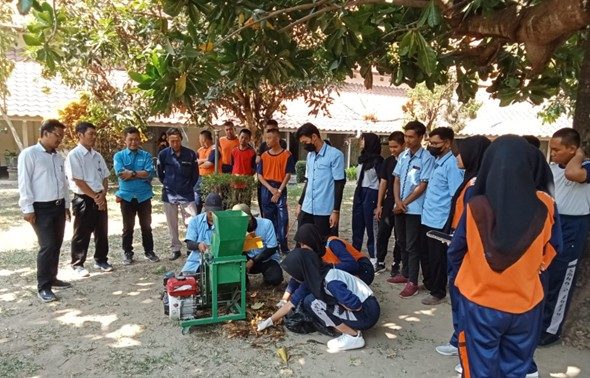Hashtags: #SDG’s, #SDG’s 4, #SDG’s 5
News Release Monday, 27 May 2024
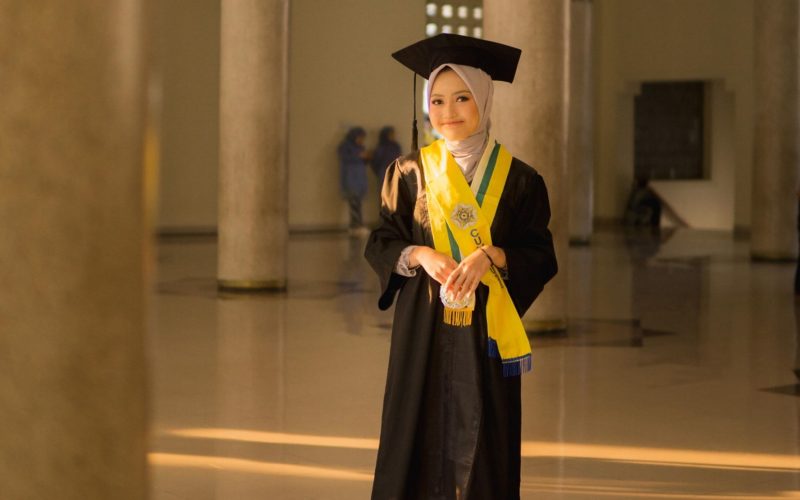
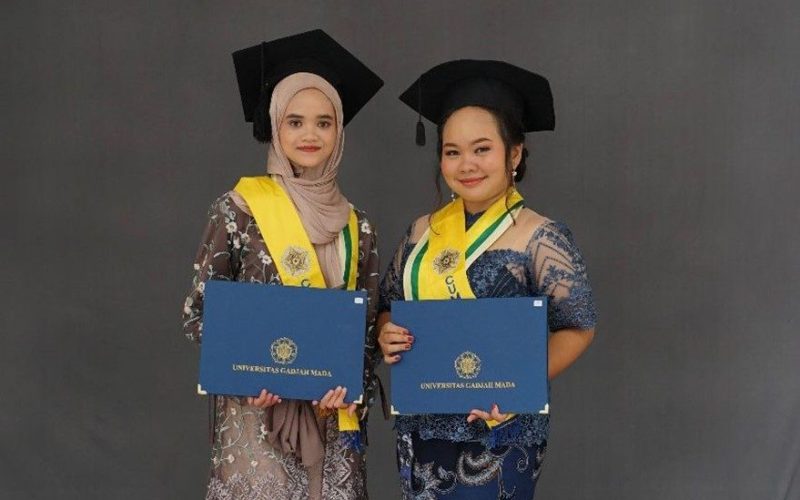
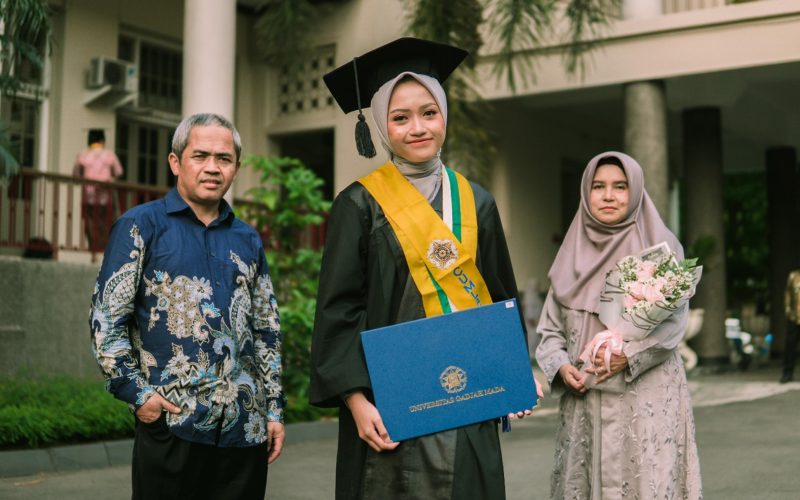
Hashtags: #SDG’s, #SDG’s 4, #SDG’s 5
Community ServiceHeadlineNews ReleaseWaste Management Monday, 6 May 2024
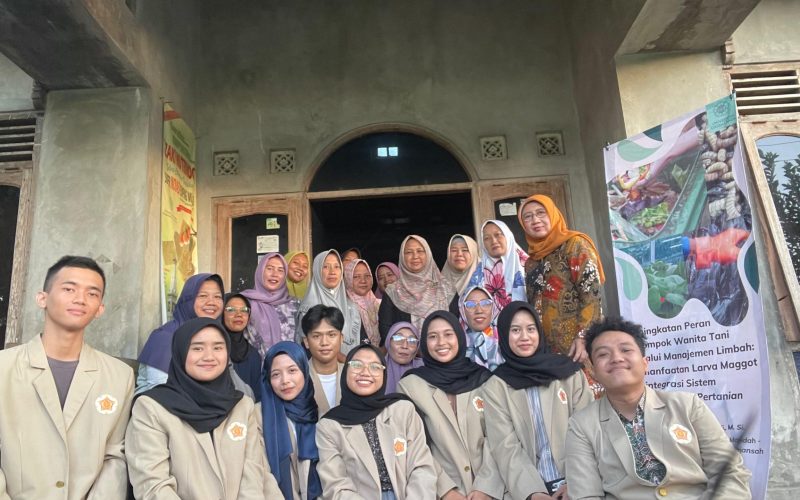
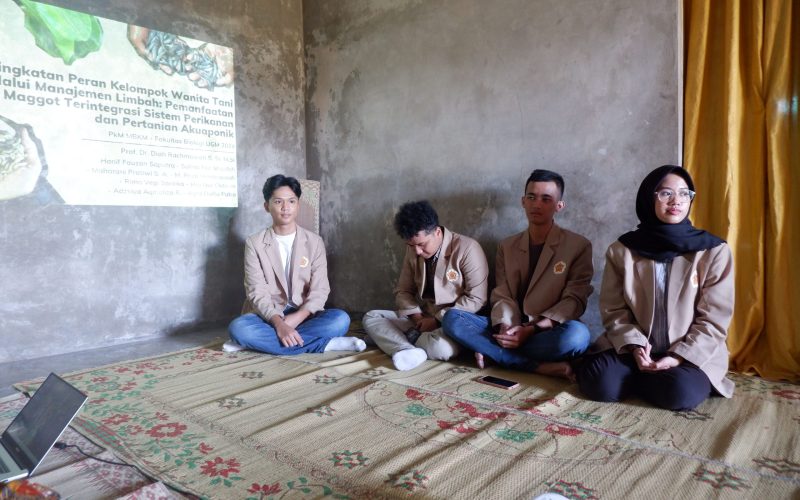
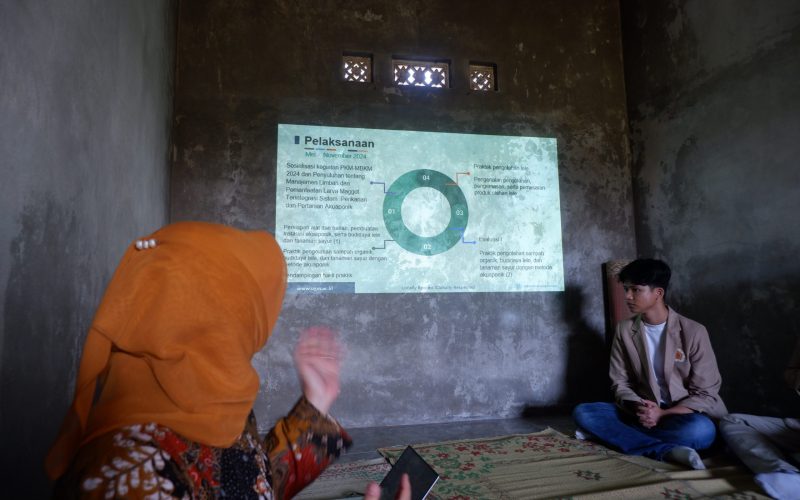
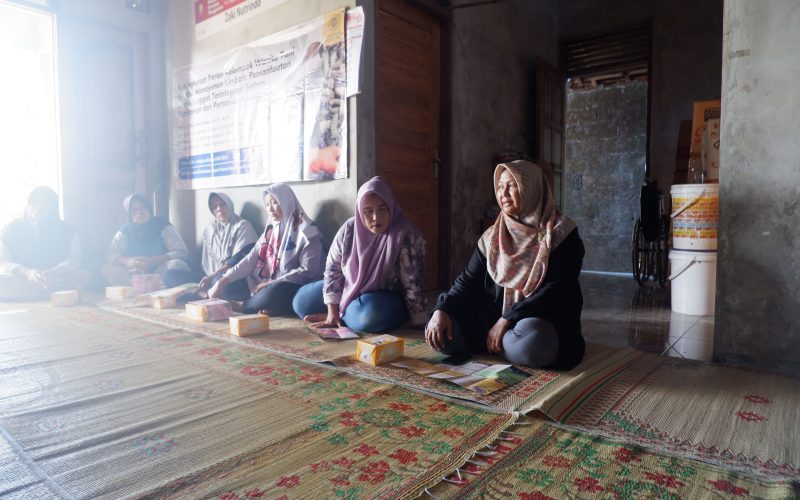
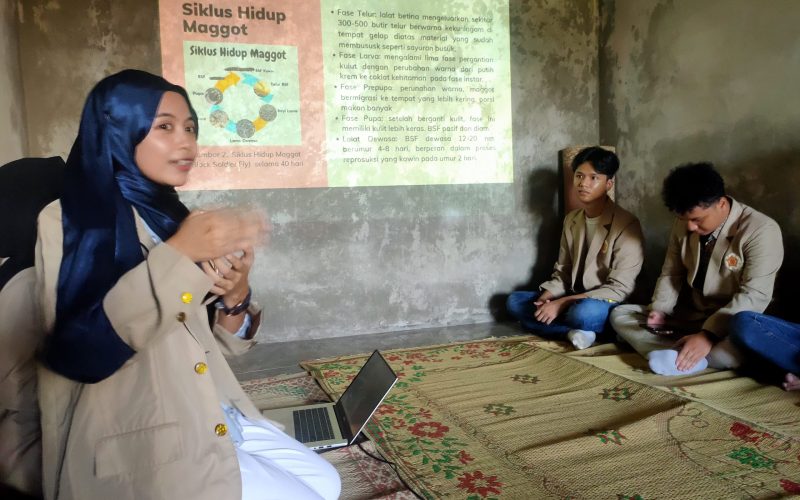
Community ServiceHeadlineWaste Management Thursday, 14 March 2024
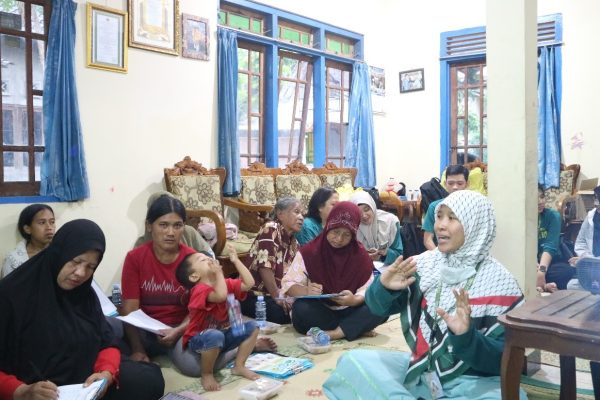
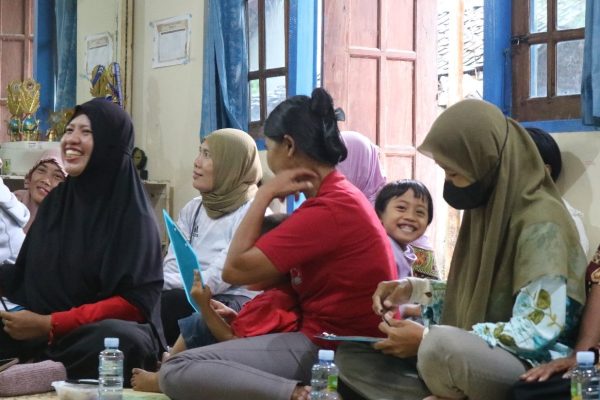
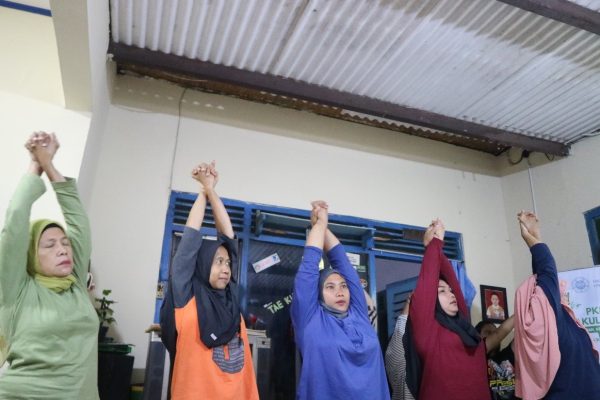
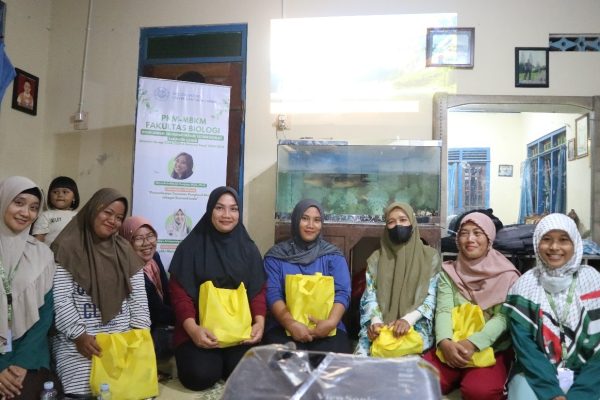
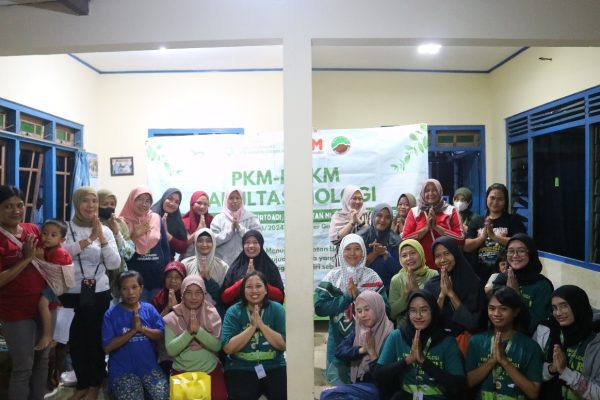
HeadlineNews Release Tuesday, 20 February 2024
On Thursday, February 15, 2024, Class IV from SD Negeri Deresan Yogyakarta had a special opportunity to

explore the world of science through an inspiring visit to the Animal Structure and Development Laboratory of the Faculty of Biology at UGM. This visit aimed to provide a deeper understanding of the scientifi
c concepts they learn in class and to inspire their interest in science. A total of 58 fourth-grade students from SDN Deresan, accompanied by 2 homeroom teachers and 4 accompanying teachers, were welcomed at the Faculty of Biology UGM by the Faculty’s Guest Reception Team and greeted by the Head of the Animal Structure and Development Laboratory, Dr. Ardaning Nuruliani, M. Kes. The children were then divided according to their classes and invited to the Histology & Embryology Section and the Animal Anatomy Section of the Animal Structure and Development Laboratory. All the lecturers of the Animal Structure and Development Laboratory, along with Master’s and Bachelor’s students conducting research there, also welcomed the students.
 In the Histology & Embryology Section, students were introduced to microscopes and how to use them. They also observed the diffusion process and colorful microscopic preparations. Meanwhile, in the Animal Anatomy Section, students observed skeletal preparations, internal organs, and several anatomical specimens. The children showed remarkable enthusiasm and deep curiosity while learning in the laboratory. The visit also included a question-and-answer session, where the children were given the opportunity to ask questions about interesting science topics to the Master’s and Bachelor’s students conducting research in the laboratory. Intelligent and creative questions flowed, reflecting the growing interest in science among the young generation.
In the Histology & Embryology Section, students were introduced to microscopes and how to use them. They also observed the diffusion process and colorful microscopic preparations. Meanwhile, in the Animal Anatomy Section, students observed skeletal preparations, internal organs, and several anatomical specimens. The children showed remarkable enthusiasm and deep curiosity while learning in the laboratory. The visit also included a question-and-answer session, where the children were given the opportunity to ask questions about interesting science topics to the Master’s and Bachelor’s students conducting research in the laboratory. Intelligent and creative questions flowed, reflecting the growing interest in science among the young generation.
According to Mr. Paino, A. Ma (IVA Class Teacher) and Mr. Danang Nor Wicaksana, S.Pd. (IVB Class Teacher), this visit is part of the school’s efforts to provide diverse and in-depth learning experiences for their students. The students ended their visit with bright smiles on their faces and a deep sense of inspiration. “I want to be a scientist one day!” ; “I want to study here” and “I want to go to UGM” exclaimed the fourth graders with sparkling eyes. Such hopes may seem distant, but with visits like this, those possibilities feel much closer.
This activity of welcoming elementary school students is part of the Faculty of Biology’s commitment to supporting Sustainable Development Goals (SDGs) goal no. 4 Quality Education, goal no. 5 Gender Equality, and goal no. 17 Partnership for the Goals. Additionally, this initiative aligns with SDG goal no. 9 Industry, Innovation, and Infrastructure by fostering early interest in science and technology, and goal no. 10 Reduced Inequalities by providing equal learning opportunities regardless of background.
Community ServiceHeadlineWaste Management Thursday, 9 November 2023
The team of Pengabdian Kepada Masyarakat – Merdeka Belajar Kampus Merdeka (PkM-MBKM) Faculty of Biology UGM 2023 that chaired by Rina Sri Kasiamdari, Ph.D. and involved two students, namely Galuh Kirana Mahadewi and Laila Uswatun Chasanah, carried out again a series of Community Service activities in Kepuh Kulon RT 001, Wirokerten, Banguntapan, Bantul. This activity is a continuity of the PkM-MBKM activities that have been carried out previously from February to June 2023.
The first activity of this PkM MBKM phase II was held on Sunday, October 8th 2023 from 09.00 to 11.00 WIB at the house of the neighborhood head of Kepuh Kulon RT 001, Mr. Zamzuri, and attended by 18 people of Kepuh Kulon RT 001. The activity on that day was packaging the compost and eco enzymes that had been made previously. First of all, Galuh and Laila gave a short explanation and demonstration about how to harvest and package the compost and eco enzyme. The compost was harvested by dried it for a while. After that, the compost could be packaged in a customized plastic ziplock. Unlike the compost, eco enzymes must be filtered between the fruits that are used and the water and then packaged in 250 mL bottles as much as 60 bottles. The compost that have been made is used for plant fertilization, while the eco enzyme is used for washing dishes, cleaning floors, repelling pests, cleaning vegetables and fruit from pests, and cleaning glass or glass surfaces. The compost and eco enzymes that are already packed and labeled are given to the Head of Wirokerten village and the Head of Hamlet. Hopefully, the skills of the women residents of Kepuh Kulon RT 001 in making compost and eco enzymes can become a reference in managing daily household waste, so that they can reduce the accumulation of waste and can make household waste more useful.
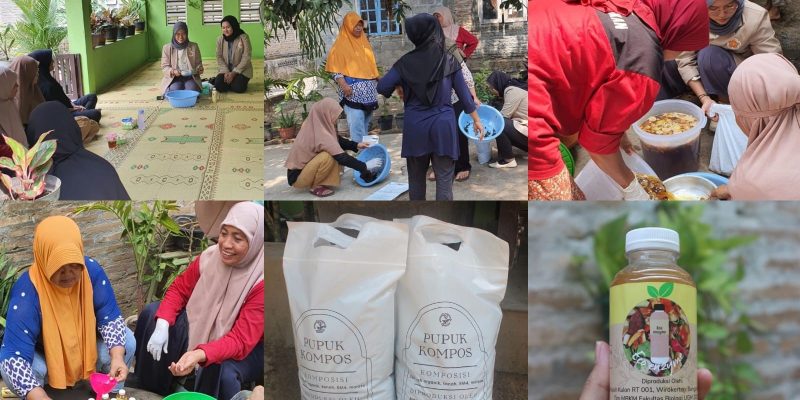
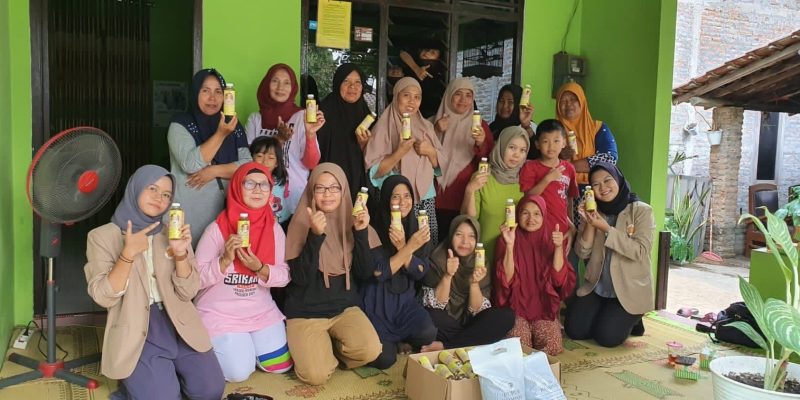
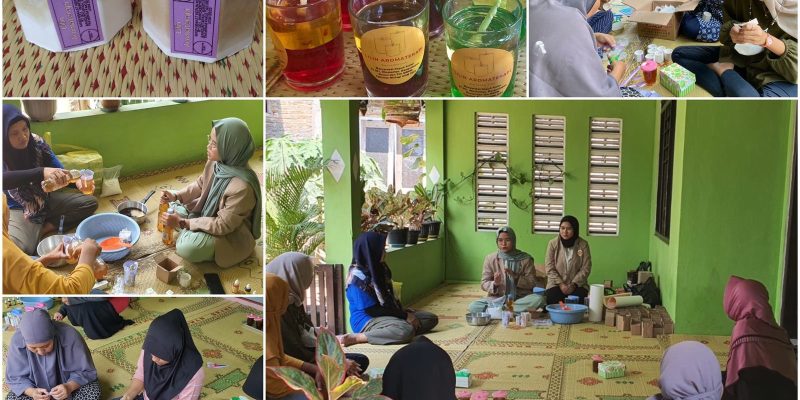
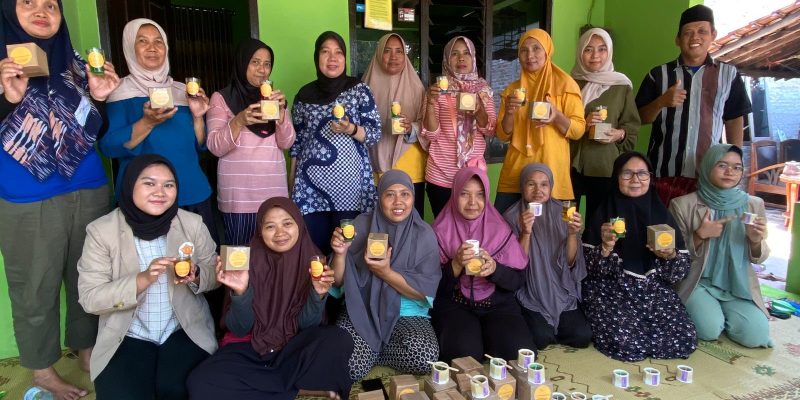
The second activity was about utilising used cooking oil (UCO) that become household waste into aromatherapy candles. It was held on Sunday, October 29th 2023 from 09.00 to 12.30 WIB at the house of the neighborhood head of RT 001 Kepuh Kulon, Mr. Zamzuri, and attended by 18 people of Kepuh Kulon RT 001. In this activity, the used cooking oil was made into solid aromatherapy candles and liquid aromatherapy candles. Tools and materials that used for making solid aromatherapy candles were used candle wick, wood holder, tea filter, plastic basin, pan, measuring cup, stove, cement pot, saucepan, cutting board, knife, spoon, used cooking oil, stearic acid, crayon, and essential oil, whereas the tools and materials that used for making liquid aromatherapy candles were glass cup, tissue paper, the cover of pudding cup, five different food colouring, water, used cooking oil, and essential oil. During the practice of making aromatherapy candles, we produced 100 solid aromatherapy candles and 25 liquid aromatherapy candles. All of them were distributed and could be used by the residents of Kepuh Kulon RT 001. Hopefully, the utilisation of UCO into aromatherapy candle could be one of the solution for reducing oil waste that can cause an environmental pollution and also could be a micro/small/medium enterprises (MSMEs) business idea for Kepuh Kulon RT 001 residents. The aromatherapy candles also distributed to the Head of the Hamlet, and the Head of Wirokerten Village. It is hoped that this PkM-MBKM program can provide new knowledge for Kepuh Kulon RT 001 residents in processing and utilizing household waste into more useful products.
HeadlineNews ReleaseWaste Management Tuesday, 7 November 2023
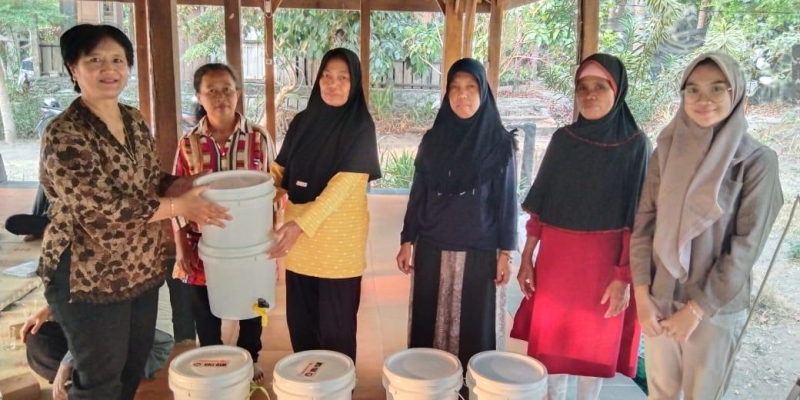
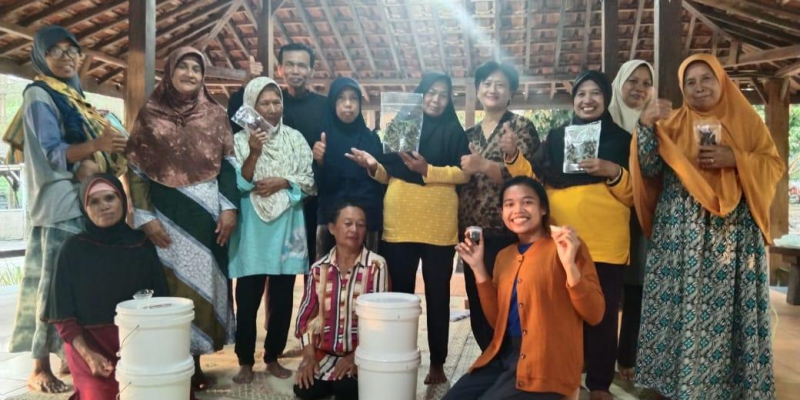
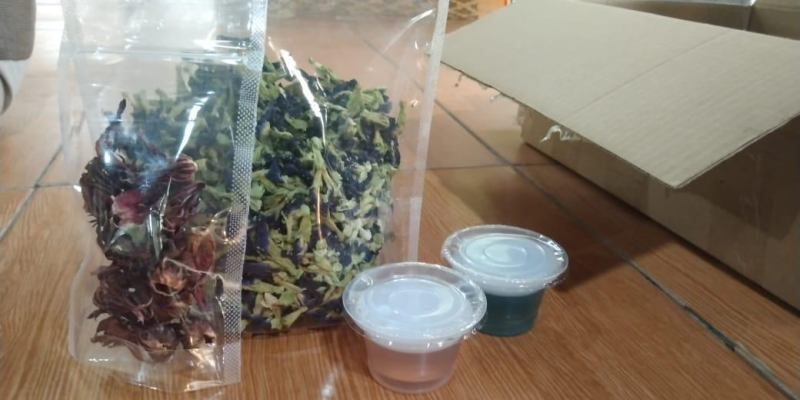
AchivementsHeadlineNews ReleaseWaste Management Wednesday, 1 November 2023
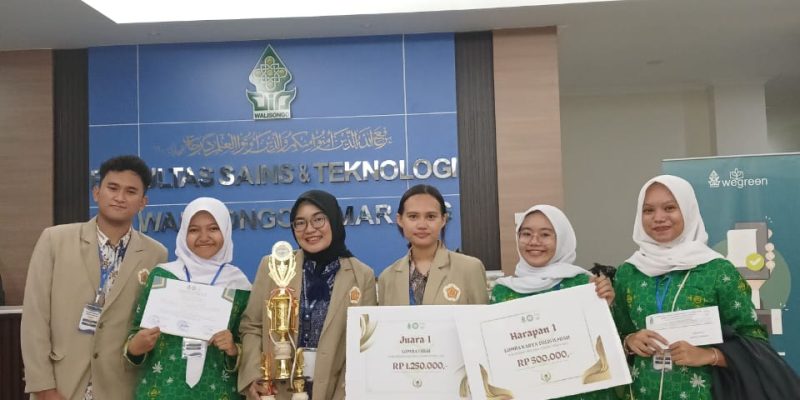
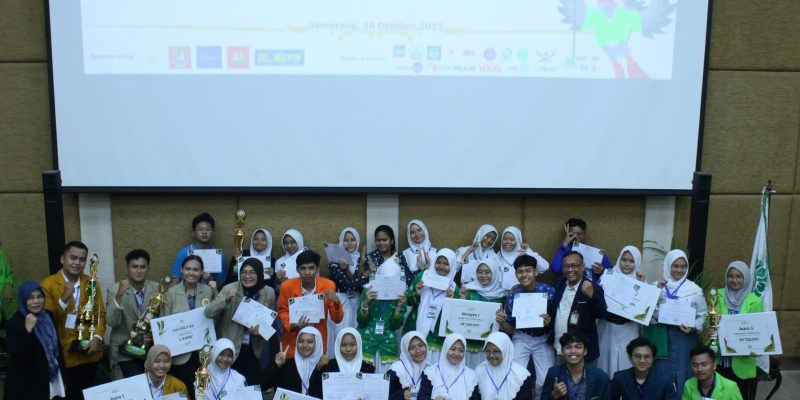
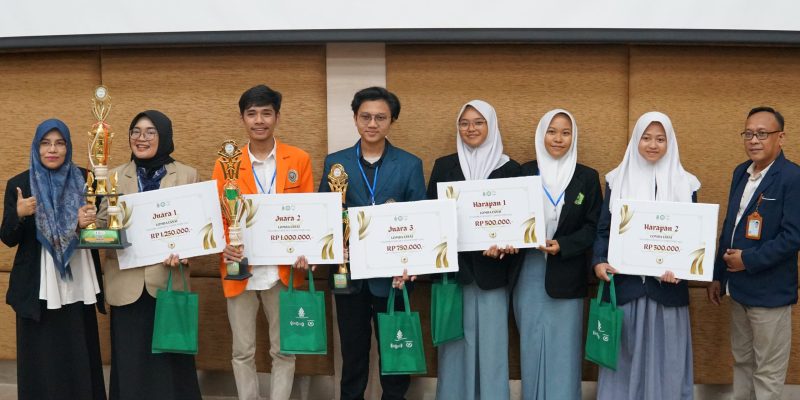
HeadlineNews ReleaseWaste Management Saturday, 28 October 2023
Yogyakarta, 27 October 2023 – The 8th International Conference of Biological Science (ICBS) Faculty of Biology, Universitas Gadjah Mada was held again via hybrid after the previous successful event in 2021. With the theme “Leveraging Biodiversity to Support Green Economy and Climate Resilience”, ICBS was held in collaboration with Tun Hussein Onn University Malaysia (UTHM) and the Indonesian Biology Consortium (KOBI) for two days, 27 and 28 October 2023, at the Grand Ballroom of the Eastparc Hotel Yogyakarta. This conference is part of the Faculty of Biology UGM commitment to its contribution to sustainable development goals (SDGs).
The biennial conference began with a traditional dance performance “Lintang Kemukus” performed by five female students from the Faculty of Biology UGM Executive Board of Postgraduate Student. The Lintang Kemukus Dance is a traditional dance from Banyuwangi, East Java which expresses the charm of women that radiates from the beauty of their souls and is not susceptible to being weathered and lost by changing times.
“This year’s ICBS accomodated 7 topics and received more than 150 articles from the USA, India, Australia, Mexico, Malaysia, and Indonesia which were presented offline and online,” said Dr. Miftahul Ilmi, M.Si., Chair of the Committee for the 8th International Conference of Biological Science in his speech Friday (27/10). The topics include biosystematics, functional biology, biomedical, bioinformatics, genetics, bio-nanotechnology and bioengineering. Dr. Ilmi also said that the selected articles will be published in proceedings and partner journals including BIO Web of Conferences, Journal of Tropical Biodiversity and Biotechnology (JTBB), and Indonesian Journal of Biotechnology (IJBioTech) which have been indexed by Scopus and the Directory of Open Access Journals (DOAJ).
Prof. Dr. Mirwan Ushada, STP., M.App.Life.Sc., Director of Research at UGM was also present at the opening of ICBS 2023. He conveyed the urgency of preserving biodiversity and how it is closely related to food security and the medical world. In his speech, Prof. Mirwan also revealed the contribution of technology in the development of science through Artificial Intelligence (AI). He hopes that this conference can become a forum for gathering and sharing knowledge and ideas to create a sustainable future.
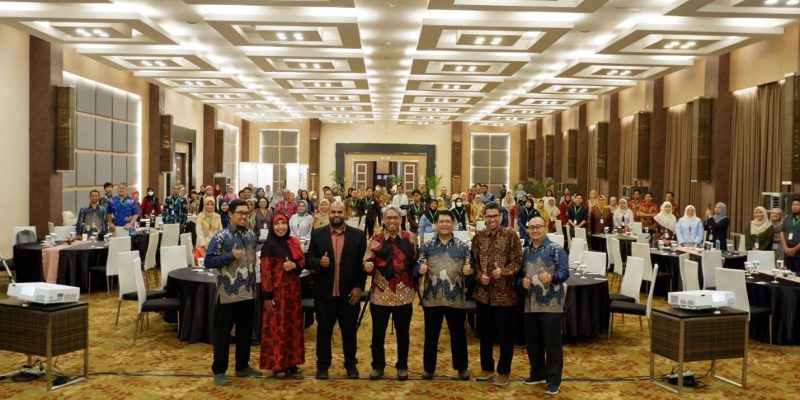
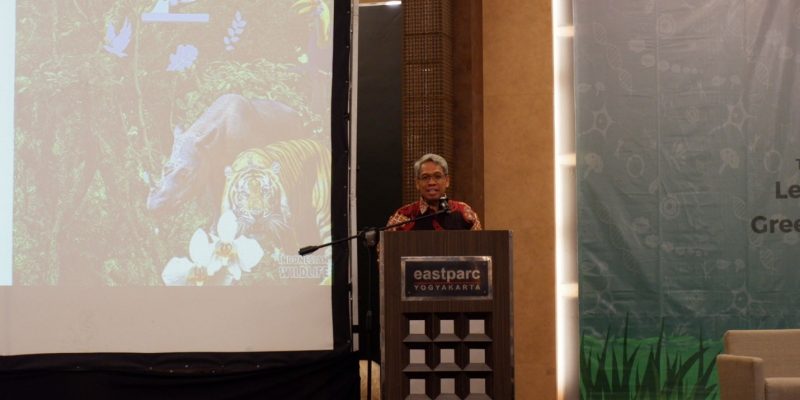
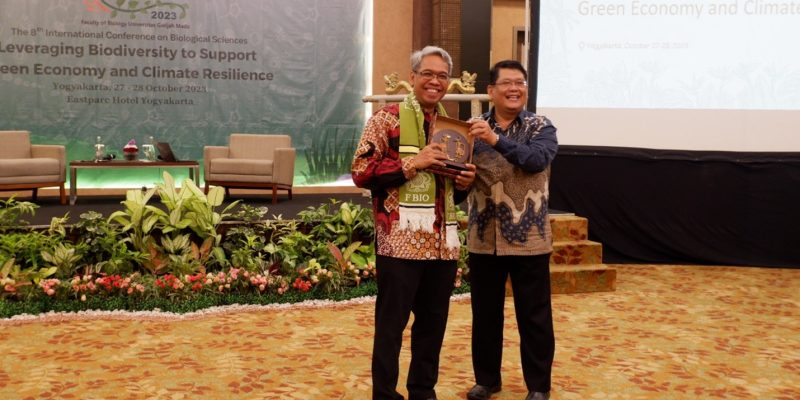
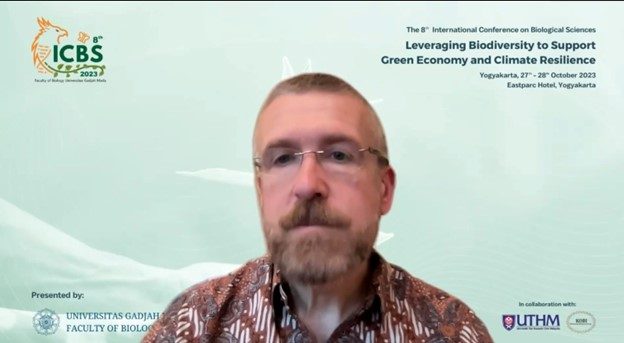
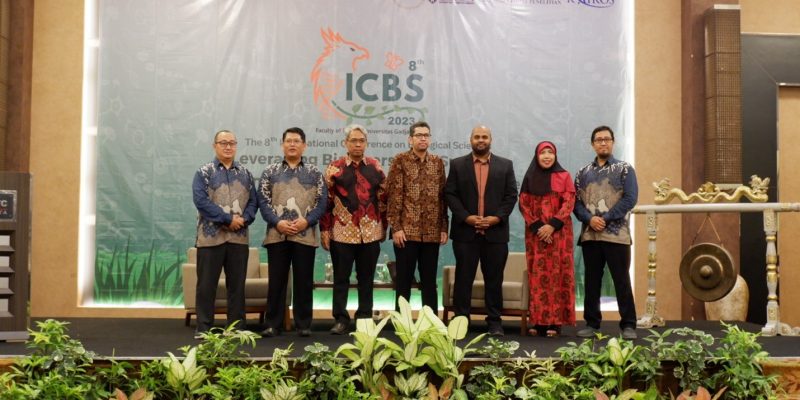
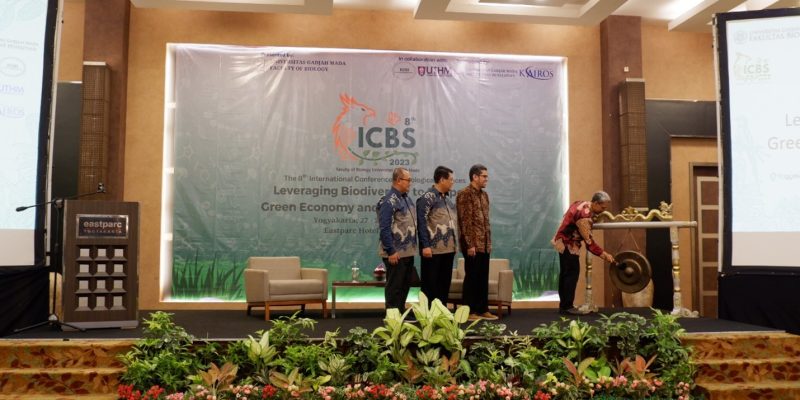
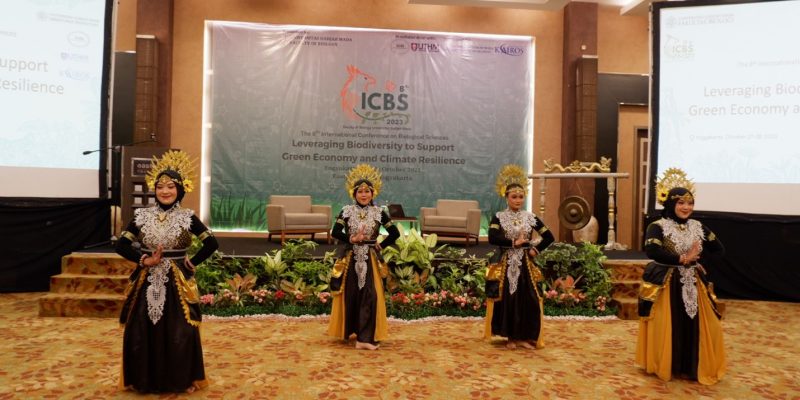
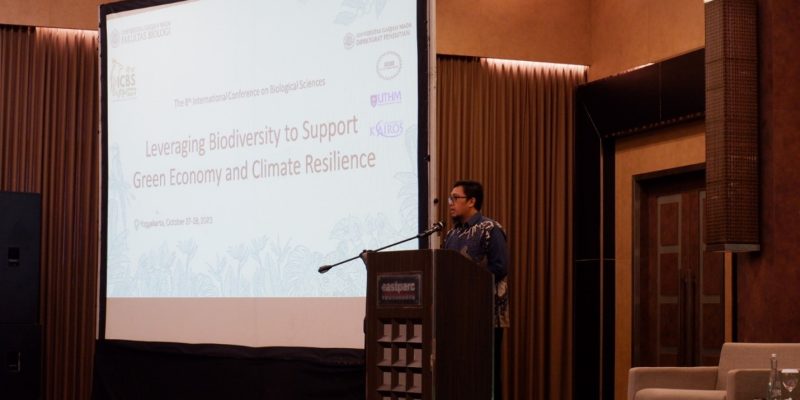
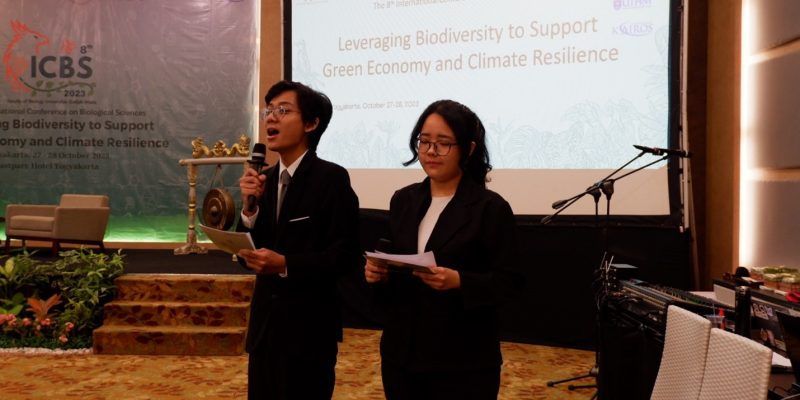
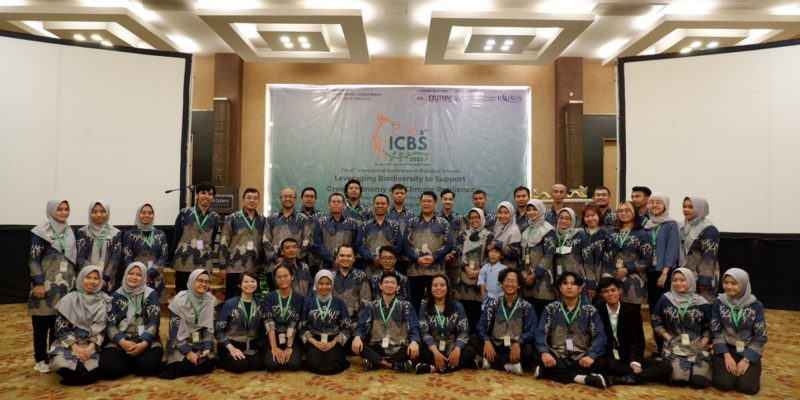
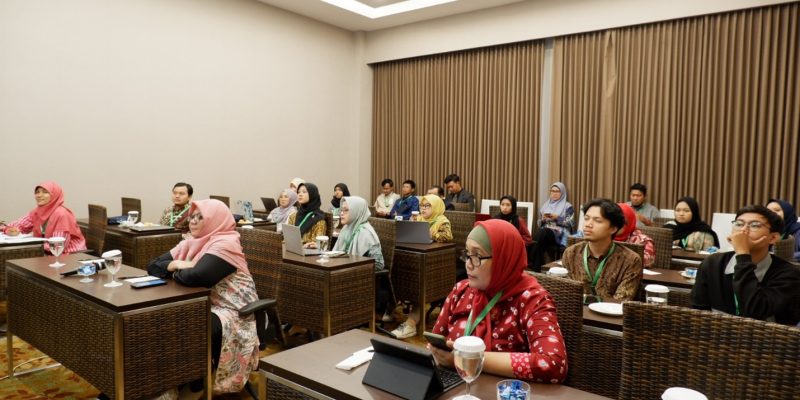
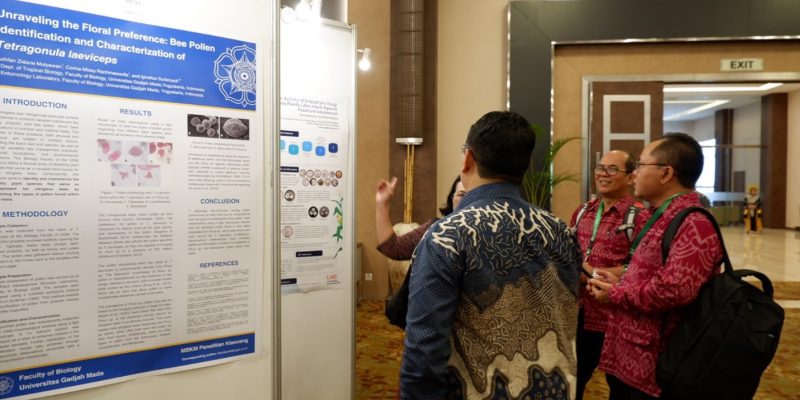
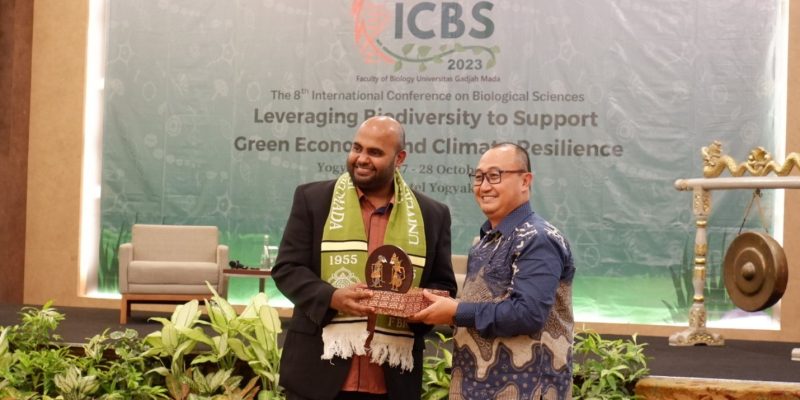
“This conference aims to be a gathering place for scientists, policy makers and academics to share various information and experiences in the realization of sustainable science, especially understanding biodiversity conservation and resilience to current climate change,” Prof. Dr. Ir. Sri Suning Kusumawardani, S.T., M.T., Director of Learning and Student Affairs, Ministry of Education, Culture, Research and Technology, then gave his welcoming speech for ICBS 2023.
“Through this conference, we hope to be able to explore deeply how to use biodiversity to build a sustainable economy and build resilience to climate change. We also hope that all participants can contribute to discussions, collaboration and share insights in understanding related to biodiversity conservation and utilization,” said Prof. Dr. Budi Setiadi Daryono, M.Agr.Sc. in his speech. Together with Prof. Dr. Satyawan Pudyatmoko from the Ministry of Environment and Forestry of the Republic of Indonesia, Prof. Mirwan, and Dr. Eko as Vice Dean for Research, Community Service, Collaboration and Alumni Affairs, Prof. Budi opened the conference by striking the gong three times.
The keynote speaker at the 8th International Conference of Biological Science this time was delivered by Prof. Dr. Satyawan Pudyatmoko, Director General of Natural Resources and Ecosystem Conservation, Ministry of Environment and Forestry of the Republic of Indonesia. Prof. Satyawan conveyed how humans contribute significantly to the earth’s climate conditions and anthropogenic climate change also affects the structure and function of ecosystems which indirectly causes a decline in human welfare. He highlighted the importance of establishing conservation areas and land protection as well as biodiversity management as important steps to address climate change.
Assoc. Prof. Ts. Dr. Muhammad Abdul Latiff from Universiti Tun Hussein Onn Malaysia, was also invited to be a speaker at ICBS this time. He gave a presentation entitled “Primate-Based Tourism: Fostering Biodiversity Conservation and Empowering local Communities through Green Economy”. He highlighted the importance of synergy between primate-based tourism and community-based conservation (CBC), which is an effort to increase conservation as well as empower local communities for sustainable development.
The next keynote speaker is Assoc. Prof. Dr. Michael Sauer, Head of Department of Biotechnology OMV AG from the University of Natural Resources and Life Science, BOKU, Austria. Dr. Michael presented on microbial culture for sustainable chemical production. Dr. Michael highlighted the limitations in fuel and chemical production due to limited resources and climate change. A microbial fermentation process that converts plant biomass and waste as a source of chemical production.
The 8th International Conference of Biological Science is expected to become a forum for communication and sharing for researchers to collaborate and innovate to develop biodiversity-based sustainable development. This is in line with contributions to increasing science and inclusive education (SDG 4), especially in developing biodiversity conservation (SDG 14 and 15) and handling climate change (SDG 13) through sustainable partnerships (SDG 17).
Community ServiceHeadlineWaste Management Tuesday, 17 October 2023
On Sunday, October 15th, 2023, the team of Merdeka Belajar Kampus Merdeka-Pengabdian kepada Masyarakat (MBKM-PkM) 2023 Faculty of Biology, Universitas Gadjah Mada, conducted another socialization activity for the residents in Pajangan, Wedomartani, Ngemplak, Sleman, Yogyakarta, regarding the production of liquid organic fertilizer (LOF) and eco-enzyme. This socialization was organized to encourage the community to manage organic waste into something beneficial, such as liquid organic fertilizer (LOF) and eco-enzyme. The speakers for this socialization were the MBKM-PkM 2023 team, consisting of five undergraduate students of Faculty of Biology, Unviersitas Gadjah Mada, class of 2020, they were Arba’ Ramadhani Artik, Arneta Yuvita, Ester Dewanti Yovita Wardani, Fadiah Sri Rahayu, and Zidni Meirizka Utami, under supervision Dr. Ardaning Nuriliani, S.Si., M.Kes. and the partner mentor Ms. Nurini Aru Sudarsi. The MBKM-PkM 2023 team conducted the socialization with the theme “Caring for the Earth Starts from Our Kitchen.” This theme included two main topics: liquid organic fertilizer and eco-enzyme. The first topic covered the importance of macro and micro nutrients for plants, the definition of organic and inorganic fertilizers, the differences between organic and inorganic fertilizers (chemical), the advantages and disadvantages of organic and inorganic fertilizers, the production process of liquid organic fertilizer, as well as its application. The second topic explained the concept of eco-enzyme, its advantages and disadvantages, its benefits, the production process of Eco-enzyme, as well as its application.
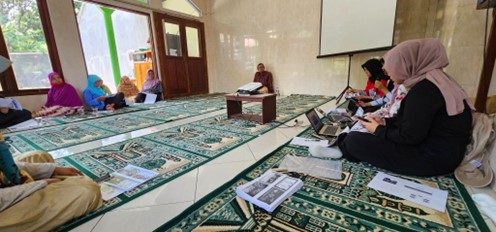
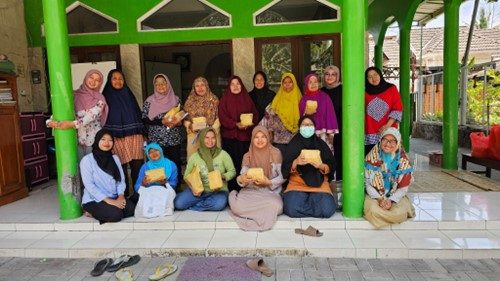
Effective management of organic waste is crucial at present, given the issues related to the limited space for waste disposal at the Piyungan Final Disposal Site in the Special Region of Yogyakarta. Producing liquid organic fertilizer (LOF) and eco-enzyme is one way to manage organic waste such as food scraps, vegetable waste, fruit waste, and leaves, turning them into something beneficial for the environment. Liquid organic fertilizer (LOF) can be used to nurture plants without worrying about chemical effects on them. Meanwhile, eco-enzyme can serve not only as a fertilizer component but also as a detergent or cleanser and pest control for plants. The production of LOF and Eco-enzyme doesn’t require significant costs; it mainly relies on organic waste from the kitchen, water, molasses solution (brown sugar, palm sugar, coconut sugar), and EM4 solution.
This socialization received a positive response and enthusiasm from the residents of Pajangan Hamlet who actively participated in the discussion sessions with the speakers. It is hoped that the socialization by the MBKM-PkM 2023 team will raise awareness and engagement, particularly among the residents of Pajangan Hamlet, in environmentally friendly practices by managing kitchen and organic waste and turning them into something useful for the environment. (SDGs 3).
HeadlineNews ReleaseWaste Management Monday, 16 October 2023

